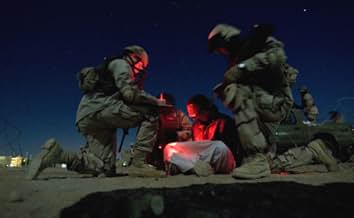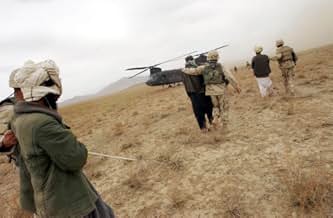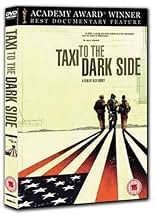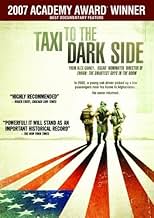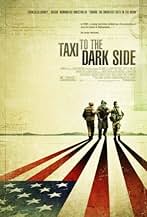IMDb-BEWERTUNG
7,5/10
17.346
IHRE BEWERTUNG
Füge eine Handlung in deiner Sprache hinzuAlex Gibney exposes the haunting details of the USA's torture and interrogation practices during the War in Afghanistan.Alex Gibney exposes the haunting details of the USA's torture and interrogation practices during the War in Afghanistan.Alex Gibney exposes the haunting details of the USA's torture and interrogation practices during the War in Afghanistan.
- 1 Oscar gewonnen
- 10 Gewinne & 5 Nominierungen insgesamt
Alex Gibney
- Narrator
- (Synchronisation)
Moazzam Begg
- Self - Torture Victim
- (as Moazzam Beg)
George W. Bush
- Self
- (Archivfilmmaterial)
Jack Cafferty
- Self
- (Archivfilmmaterial)
Dick Cheney
- Self
- (Archivfilmmaterial)
Lynndie England
- Self
- (Archivfilmmaterial)
Tommy Franks
- Self - General
- (Archivfilmmaterial)
Empfohlene Bewertungen
Taxi to the Dark Side accomplishes what a documentary, or just a concise analysis, regarding all of the facts in one of the many nightmares the United States' involvement in the middle east should: to inspire the utmost disgust and condemnation of a system that has become as corrupt as it has (or rather always has been with this bunch). It's uncontainable to think how all of this started, grew exponentially, and resulted ultimately in the horrors at Abu Gharyb and Guantanamo Bay, in that it is nestled in the twisted, criminal (yes folks, criminal) 'policies' of the Bush administration. But Alex Gibney's approach isn't narrow-minded but multi-faceted: he's interested in what a complex, ugly organism torture has become, the psychological just as much as the physical, and he has a man at the center of it. Dilawar, an innocent taxi driver from a poor farm in Afghanistan, was swept up by three other Afghan soldiers and sent to Bagram prison, where along with other supposed terrorists or terrorist collaborators was tortured (in his case especially in brutal fashion, as we learn in graphic description from those who participated first-hand), and died from the trauma.
His death was a controversy, but not one that ever got the kind of attention it deserved; until this documentary I never even heard of Dilawar or even much about Bagram prison. Yet it was at this prison, as well as the first biggie interrogation of the would-be 20th hijacker of the plane on 9/11 to crash in Pennsylvania (which, by false confession, led to an over-excited but false-rooted assumption that Al Quaeda had links to Baghdad), that led to Abu Gharyb, which revealed the horrors of soldiers in unyielding terror over their subjects but, more importantly, the virus that spread through the chain of command. Gibney's approach is approximate and expertly probing: it's not enough to just focus of Dilawar (even as his story could make up a whole legitimate documentary alone), or on Abu Gharyb. As in his previous film, Enron: The Smartest Guys in the Room, it's essential to dissect this wretched beast from top to bottom, to see not simply the soldiers first-hand accounts, but straight from the horse's mouth the words from Cheney, Rumsfeld, Powell, and Bush himself.
Because, in reality, there is something to feel sorry for with these soldiers. It can be argued, and not without just cause, that what the soldiers did at Bagram, Abu Gharyb, and to an extent even at GITMO, was wrong and rotten and they could have said no and so on and so forth. However, as with the ground war situation in Iraq, it's all about the chain of command, and the fact that no matter what the parties initially responsible are not held accountable for any of their actions. It's almost frightening to forget the amount of footage available with these men like Rumsfeld and Gonzalez and Cheney where they not only admit to being fine with torture tactics - and whether or not it's psychological torture or not is besides the point as ALL torture IS torture, albeit a facet that Gibney brilliantly chronicles in the history of the CIA to its 'logical' extension in recent years - but set it up in legal wrangling so as to not get it any trouble for what they've done which is, of course, breaking Geneva conventions and whatnot.
If I sound like I'm sounding bias with this, then you should leave this review right now. There is no bias when it comes to this issue (or rather there SHOULD be no bias, as for a split second McCain showed until he relented recently that torture isn't as bad as he used to think). What one sees as the line between what is proper interrogation of a subject and outright abuse to get that "ticking time-bomb" is revealed by Kloogman from the FBI, who paraphrases how an interrogation would usually be done and lays it on the line that this form has actually had results - not pain and death or, at best, a bull**** court at GITMO where it's like a joke Kafka wouldn't write. Gibney presents all the information with the bluntness that's required, with testimony, footage from press conferences and commissions (i.e. that cringe-inducing bit with Gonzalez where he has a horrible pause when trying to answer a simple question about whether or not to condone torture), and it's presented lucidly, edited for a cumulative effect and with the skill of a filmmaker in total trust with his subject(s) to take all of the pieces into a whole that shakes one to the core.
And all of this would be powerful enough to make an impact, but with the recent explosion of news coverage on water-boarding - and that the CIA has admitted to torturing three subjects - Taxi to the Dark Side remains startlingly relevant. In fact, it's even more tragically relevant than last year's Sicko or even No End in Sight. From the tragedy of Dilawar to the tragedy of Abu Gharyb, which was like Salo turned into as shockingly real as could never be imaginable, the Bush administration has put the US into even more danger than ever before by resorting to the lowest form of humanity, condoning acts to the soldiers that sixty years ago would never be committed in the harshest of circumstances on our side. This, again, isn't some silly bias, this is just fact. It's enough to make one sick to one's stomach, and as long as a film such as this exists, the pain can't be brushed aside or dulled by diverting network news.
His death was a controversy, but not one that ever got the kind of attention it deserved; until this documentary I never even heard of Dilawar or even much about Bagram prison. Yet it was at this prison, as well as the first biggie interrogation of the would-be 20th hijacker of the plane on 9/11 to crash in Pennsylvania (which, by false confession, led to an over-excited but false-rooted assumption that Al Quaeda had links to Baghdad), that led to Abu Gharyb, which revealed the horrors of soldiers in unyielding terror over their subjects but, more importantly, the virus that spread through the chain of command. Gibney's approach is approximate and expertly probing: it's not enough to just focus of Dilawar (even as his story could make up a whole legitimate documentary alone), or on Abu Gharyb. As in his previous film, Enron: The Smartest Guys in the Room, it's essential to dissect this wretched beast from top to bottom, to see not simply the soldiers first-hand accounts, but straight from the horse's mouth the words from Cheney, Rumsfeld, Powell, and Bush himself.
Because, in reality, there is something to feel sorry for with these soldiers. It can be argued, and not without just cause, that what the soldiers did at Bagram, Abu Gharyb, and to an extent even at GITMO, was wrong and rotten and they could have said no and so on and so forth. However, as with the ground war situation in Iraq, it's all about the chain of command, and the fact that no matter what the parties initially responsible are not held accountable for any of their actions. It's almost frightening to forget the amount of footage available with these men like Rumsfeld and Gonzalez and Cheney where they not only admit to being fine with torture tactics - and whether or not it's psychological torture or not is besides the point as ALL torture IS torture, albeit a facet that Gibney brilliantly chronicles in the history of the CIA to its 'logical' extension in recent years - but set it up in legal wrangling so as to not get it any trouble for what they've done which is, of course, breaking Geneva conventions and whatnot.
If I sound like I'm sounding bias with this, then you should leave this review right now. There is no bias when it comes to this issue (or rather there SHOULD be no bias, as for a split second McCain showed until he relented recently that torture isn't as bad as he used to think). What one sees as the line between what is proper interrogation of a subject and outright abuse to get that "ticking time-bomb" is revealed by Kloogman from the FBI, who paraphrases how an interrogation would usually be done and lays it on the line that this form has actually had results - not pain and death or, at best, a bull**** court at GITMO where it's like a joke Kafka wouldn't write. Gibney presents all the information with the bluntness that's required, with testimony, footage from press conferences and commissions (i.e. that cringe-inducing bit with Gonzalez where he has a horrible pause when trying to answer a simple question about whether or not to condone torture), and it's presented lucidly, edited for a cumulative effect and with the skill of a filmmaker in total trust with his subject(s) to take all of the pieces into a whole that shakes one to the core.
And all of this would be powerful enough to make an impact, but with the recent explosion of news coverage on water-boarding - and that the CIA has admitted to torturing three subjects - Taxi to the Dark Side remains startlingly relevant. In fact, it's even more tragically relevant than last year's Sicko or even No End in Sight. From the tragedy of Dilawar to the tragedy of Abu Gharyb, which was like Salo turned into as shockingly real as could never be imaginable, the Bush administration has put the US into even more danger than ever before by resorting to the lowest form of humanity, condoning acts to the soldiers that sixty years ago would never be committed in the harshest of circumstances on our side. This, again, isn't some silly bias, this is just fact. It's enough to make one sick to one's stomach, and as long as a film such as this exists, the pain can't be brushed aside or dulled by diverting network news.
This horrifying documentary won the Oscar for 2007. Using the case of an innocent Afghan taxi driver who were tortured to death by American interrogators in Bagram prison as the starting point, the film chronicles the atrocities committed by the Bush administration in the name of American people and an ill-defined 'war on terror'.
The film is written, directed and narrated by Alex Gibney, son of a high-ranking naval officer who was an interrogator in World War II. A great American and a true patriot, Frank Gibney's final disappointment of what became of the great nation of the United States in the hands of a few liars is heart-wrenching.
There is not a single frame in the film that is not supported by hard evidence. All of the investigation was conducted by Americans whose credentials of decency and patriotism are above suspicion. The film is a chronicle of how paranoia, self-serving deceit and mere stupidity can threaten the very values a great nation was built on. It should be impossible for anyone who watches this meticulous document to ever criticize the veracity of claims put forward by the recent films, Rendition, In the Valley of Elah, or Redacted - flawed as films though that they were.
Every person in the world, especially every American, that cares about the true nature of freedom and the sanctity of the individual (the basic tenets on which America was built) should see this film. How could anyone claim that it would be loved only by the supporters of Taliban is beyond me.
The film is written, directed and narrated by Alex Gibney, son of a high-ranking naval officer who was an interrogator in World War II. A great American and a true patriot, Frank Gibney's final disappointment of what became of the great nation of the United States in the hands of a few liars is heart-wrenching.
There is not a single frame in the film that is not supported by hard evidence. All of the investigation was conducted by Americans whose credentials of decency and patriotism are above suspicion. The film is a chronicle of how paranoia, self-serving deceit and mere stupidity can threaten the very values a great nation was built on. It should be impossible for anyone who watches this meticulous document to ever criticize the veracity of claims put forward by the recent films, Rendition, In the Valley of Elah, or Redacted - flawed as films though that they were.
Every person in the world, especially every American, that cares about the true nature of freedom and the sanctity of the individual (the basic tenets on which America was built) should see this film. How could anyone claim that it would be loved only by the supporters of Taliban is beyond me.
Yep, it is another one of those Iraq and Afghanistan documentaries. I know the burnout rate is high on these, which is probably why I almost did not bother, but nothing else was showing. Man, was I happy I saw this! It has rekindled my hate for the Bush administration, which had turned to apathy over the last year. This tells the story of an Afghani taxi driver that is mistakenly picked up as a Taliban supporter, but before they find out he was innocent, he has been beaten to death by his American torturers.
This film has interviews from all of the guards that were responsible, JAG officers, FBI people, CIA agents on the ground etc. And you see that all of the blame lies with Ashcroft and the Bushies, who gave one vague order after another that they wanted confessions and they wanted them quickly, with a wink and a nod about what kind of methods to use. So you have these frustrated high school drop-outs presiding over these people thousands of miles from anywhere, and they won't confess. So, beatings and humiliations follow. And when the crap comes out, the Bush administration passes a bill that absolves all higher-ups from any responsibility and they start to bust the enlisted men and women, who were following orders. Pathetic. Of course, we also find out that over 95% of the prisoners being held, were captured by Pakistanis and Northern Alliance people, WHO were paid by the US government for each person they turned over, guilty or not guilty. And you wonder why meaningful confessions were so hard to come by. It reminds me of the scene from Full Metal Jacket, where the psycho army guy shoots the Vietnamese farmers from his helicopter. He says the ones that run are VC, the ones that don't run are well trained VC. Very tragic.
This film has interviews from all of the guards that were responsible, JAG officers, FBI people, CIA agents on the ground etc. And you see that all of the blame lies with Ashcroft and the Bushies, who gave one vague order after another that they wanted confessions and they wanted them quickly, with a wink and a nod about what kind of methods to use. So you have these frustrated high school drop-outs presiding over these people thousands of miles from anywhere, and they won't confess. So, beatings and humiliations follow. And when the crap comes out, the Bush administration passes a bill that absolves all higher-ups from any responsibility and they start to bust the enlisted men and women, who were following orders. Pathetic. Of course, we also find out that over 95% of the prisoners being held, were captured by Pakistanis and Northern Alliance people, WHO were paid by the US government for each person they turned over, guilty or not guilty. And you wonder why meaningful confessions were so hard to come by. It reminds me of the scene from Full Metal Jacket, where the psycho army guy shoots the Vietnamese farmers from his helicopter. He says the ones that run are VC, the ones that don't run are well trained VC. Very tragic.
In 2002 taxi driver Dilawar was picked up by US forces with his passengers in the desert and taken to Bagram prison in Afghanistan. Five days later he was dead. Injuries to his legs were compared with those he would have sustained if he had been run over by a truck had he lived it was likely that his legs would have had to have been amputated due to the damage. With this as the starting point, this documentary tells the story of the role of "torture" in the war on terror, from Abu Ghraid to Guantanamo.
Having put Gibney's documentary on Enron as one of my ten favourite films of 2005, I eagerly took up the opportunity the UK (and much of Europe) had to catch this on television ahead of the full release in the US in 2008. Shown as part of the BBC's excellent "Why Democracy" series of films, this one opened with the caption question "can terrorism destroy democracy?". To the casual listener the question appears to be about the ability of terrorists to bring down what we see as Government (ie by crashing planes into it) but really the question in regards this film appears to be more about whether our idea of freedom and democracy can survive the way we fight terrorism. As a result this film is about the use of "torture" against terrorist suspects, specifically focusing on the United States.
The reader may be wondering why the focus (in the title) on Dilawar. Well I did too because he died in Bagram and his story sadly ends there, while the vast majority of the film focuses on the infamous examples of torture and inhumane treatment in the other places. Well it turns out that Dilawar is a device and one that the film uses very well. The morality of the use of torture is not black and white and of course the usual "ticking time bomb" scenario is thrown up; the film does counter this by suggesting that the weekly scenarios in Fox's 24 are not the norm (to say the least) but the best answer to most of the moral questions are simply to refer back to a taxi driver who died after five days in captivity with horrific injuries the film doesn't say he was innocent but it doesn't need to nobody suggests he was evil or a key player either, but yet he is dead. This hangs over the film even though he is not the focus after the first twenty minutes.
What the film does from then on in is paint a picture of lack of respect for humanity, lack of respect for international laws, lack of accountability and lack of transparency. The film plays a clip of Rumsfeld speaking on the (then) allegations of mistreatment and says that it will be looked into so that "the world will see how a free system, a democratic system, functions and operates"; well he was right and it is not pretty viewing. As with Enron, Gibney does betray his politics and the film has very little in the way of even handedness about the debate. This is a little disappointing in regards the debate but the overwhelming nature of the presentation of arrogance and carelessness did make wonder how you would balance these issues certainly the quotes I have heard down the years from politicians have not been able to convince. Certainly a clip of Bush talking about "suspected terrorists" who have died, or as he says "put it this way they're no longer a problem to the United States"; the fact that he acknowledges they are "suspects" rather than convicts but yet sees their death as a good thing says it all.
Considering this issue is everywhere in the media, Gibney does very well to structure his film to build it from the ground up. Not only does he use the words of the Bush administration against them ("the only thing I know for certain is that these are bad people") but he also details the wider political picture beyond the blame that was dumped onto Lynndie England, Charles Graner and others. He does this very well, bringing in the input of John Yoo and the terribly smarmy Alberto Gonzales. Even after the photographs in the paper, seeing the unedited video and hearing firsthand accounts from both sides is shocking and disturbing affair again, how would you set out to "balance" these? Beyond the issue of torture I found the lack of accountability and ownership to be just as shocking as privates are floated down the river while those in charge never face worse than early retirement. The biggest challenge with this material is to keep it as a valid piece of work even as the topic grows daily and that many will be tired of hearing about it just this last week or so we have seen more debate and also the CIA deleting old tapes of interrogations (tapes that Bush has "no recollection" of existing); however Gibney brings the film to a close well, making it feel like something that can stand still and still work the personal touch of his late father's comments at the end (himself a WWII Navy interrogator) talking about how "we" should be different than "them", making for a suitable summing up of why the film is important.
Another strong documentary from Gibney despite the lack of balance and the challenges with the topic. It deserves to be seen by a bigger audience than it has been, even if it won't make the difference it should do. Depressing to think that, decades from now people will look back on this and wonder how on earth we allowed our leaders to do this in our names and let them get away with it.
Having put Gibney's documentary on Enron as one of my ten favourite films of 2005, I eagerly took up the opportunity the UK (and much of Europe) had to catch this on television ahead of the full release in the US in 2008. Shown as part of the BBC's excellent "Why Democracy" series of films, this one opened with the caption question "can terrorism destroy democracy?". To the casual listener the question appears to be about the ability of terrorists to bring down what we see as Government (ie by crashing planes into it) but really the question in regards this film appears to be more about whether our idea of freedom and democracy can survive the way we fight terrorism. As a result this film is about the use of "torture" against terrorist suspects, specifically focusing on the United States.
The reader may be wondering why the focus (in the title) on Dilawar. Well I did too because he died in Bagram and his story sadly ends there, while the vast majority of the film focuses on the infamous examples of torture and inhumane treatment in the other places. Well it turns out that Dilawar is a device and one that the film uses very well. The morality of the use of torture is not black and white and of course the usual "ticking time bomb" scenario is thrown up; the film does counter this by suggesting that the weekly scenarios in Fox's 24 are not the norm (to say the least) but the best answer to most of the moral questions are simply to refer back to a taxi driver who died after five days in captivity with horrific injuries the film doesn't say he was innocent but it doesn't need to nobody suggests he was evil or a key player either, but yet he is dead. This hangs over the film even though he is not the focus after the first twenty minutes.
What the film does from then on in is paint a picture of lack of respect for humanity, lack of respect for international laws, lack of accountability and lack of transparency. The film plays a clip of Rumsfeld speaking on the (then) allegations of mistreatment and says that it will be looked into so that "the world will see how a free system, a democratic system, functions and operates"; well he was right and it is not pretty viewing. As with Enron, Gibney does betray his politics and the film has very little in the way of even handedness about the debate. This is a little disappointing in regards the debate but the overwhelming nature of the presentation of arrogance and carelessness did make wonder how you would balance these issues certainly the quotes I have heard down the years from politicians have not been able to convince. Certainly a clip of Bush talking about "suspected terrorists" who have died, or as he says "put it this way they're no longer a problem to the United States"; the fact that he acknowledges they are "suspects" rather than convicts but yet sees their death as a good thing says it all.
Considering this issue is everywhere in the media, Gibney does very well to structure his film to build it from the ground up. Not only does he use the words of the Bush administration against them ("the only thing I know for certain is that these are bad people") but he also details the wider political picture beyond the blame that was dumped onto Lynndie England, Charles Graner and others. He does this very well, bringing in the input of John Yoo and the terribly smarmy Alberto Gonzales. Even after the photographs in the paper, seeing the unedited video and hearing firsthand accounts from both sides is shocking and disturbing affair again, how would you set out to "balance" these? Beyond the issue of torture I found the lack of accountability and ownership to be just as shocking as privates are floated down the river while those in charge never face worse than early retirement. The biggest challenge with this material is to keep it as a valid piece of work even as the topic grows daily and that many will be tired of hearing about it just this last week or so we have seen more debate and also the CIA deleting old tapes of interrogations (tapes that Bush has "no recollection" of existing); however Gibney brings the film to a close well, making it feel like something that can stand still and still work the personal touch of his late father's comments at the end (himself a WWII Navy interrogator) talking about how "we" should be different than "them", making for a suitable summing up of why the film is important.
Another strong documentary from Gibney despite the lack of balance and the challenges with the topic. It deserves to be seen by a bigger audience than it has been, even if it won't make the difference it should do. Depressing to think that, decades from now people will look back on this and wonder how on earth we allowed our leaders to do this in our names and let them get away with it.
This film is a worthy attempt to bring what has become a familiar subject throughout the Bush years without necessarily giving the other side an opportunity to state their case. While I personally support what the film is saying about questionable, even criminal policies of the Bush Administration's view on "interrogation" as a betrayal of all this country holds dear, the film leaves itself open to attack which is unfortunate. Tidbits are cherry picked from interviews and Congressional testimony, and while it's understandable that major players didn't want to sit down and give an interview, it's glaring that they aren't given an chance to explain why they've said what they said. I'll acknowledge the filmmaker probably has it right, but nevertheless, it's an unfair tactic.
The chief first hand accounts of information are from U.S. Military personnel who have been convicted of crimes (with the exception of one British national who has a harrowing, convincing story to tell). While what they have to say is compelling, the absence of any testimony of those who gave them those orders is absent. We have their attorneys or third parties removed to interpret what happened...or might have happened. While I couldn't be more sympathetic to the bind we've placed our young men and women in, the last thing I wanted to hear from an individual who's been convicted of torture and "wrongful death" (labeled a homicide by the coroner) is "I'm financially ruined." The moral quandary raised by the film isn't nearly answered until the final credits roll.
And where is Congress? Where is the oversight they are obligated to perform? Oh, they're holding hearings on steroid use in baseball.
We're never sure exactly what we're looking at. "Reenactments" are identified briefly, but clearly there is a lot that isn't documentary footage, and the famous photos of Abu Ghrabib reappear over and over frequently out of context.
This is a shameful chapter in American history, and it needs a less doctrinaire film to expose what are, as pointed out, crimes of war. One of the most effective moments is when the filmmaker's father appears over the closing credits. He is a former interrogator in WWII. His outrage rings true, and it should be every American's cry as well.
The chief first hand accounts of information are from U.S. Military personnel who have been convicted of crimes (with the exception of one British national who has a harrowing, convincing story to tell). While what they have to say is compelling, the absence of any testimony of those who gave them those orders is absent. We have their attorneys or third parties removed to interpret what happened...or might have happened. While I couldn't be more sympathetic to the bind we've placed our young men and women in, the last thing I wanted to hear from an individual who's been convicted of torture and "wrongful death" (labeled a homicide by the coroner) is "I'm financially ruined." The moral quandary raised by the film isn't nearly answered until the final credits roll.
And where is Congress? Where is the oversight they are obligated to perform? Oh, they're holding hearings on steroid use in baseball.
We're never sure exactly what we're looking at. "Reenactments" are identified briefly, but clearly there is a lot that isn't documentary footage, and the famous photos of Abu Ghrabib reappear over and over frequently out of context.
This is a shameful chapter in American history, and it needs a less doctrinaire film to expose what are, as pointed out, crimes of war. One of the most effective moments is when the filmmaker's father appears over the closing credits. He is a former interrogator in WWII. His outrage rings true, and it should be every American's cry as well.
Wusstest du schon
- Zitate
Damien Corsetti - Military Interrogator: You put people into a crazy situation, people will do crazy things.
- SoundtracksIn My Little Corner of the World
Words by Bob Hilliard Music by Lee Pockriss
Published by Better Half Music (Division of Bourne Co.)
and Emily Music Corporation
Performed by Yo La Tengo
Courtesy of Matador Records
Top-Auswahl
Melde dich zum Bewerten an und greife auf die Watchlist für personalisierte Empfehlungen zu.
- How long is Taxi to the Dark Side?Powered by Alexa
Details
Box Office
- Budget
- 1.000.000 $ (geschätzt)
- Bruttoertrag in den USA und Kanada
- 274.661 $
- Eröffnungswochenende in den USA und in Kanada
- 10.930 $
- 20. Jan. 2008
- Weltweiter Bruttoertrag
- 294.309 $
- Laufzeit
- 1 Std. 46 Min.(106 min)
- Farbe
- Sound-Mix
- Seitenverhältnis
- 1.85 : 1
Zu dieser Seite beitragen
Bearbeitung vorschlagen oder fehlenden Inhalt hinzufügen






